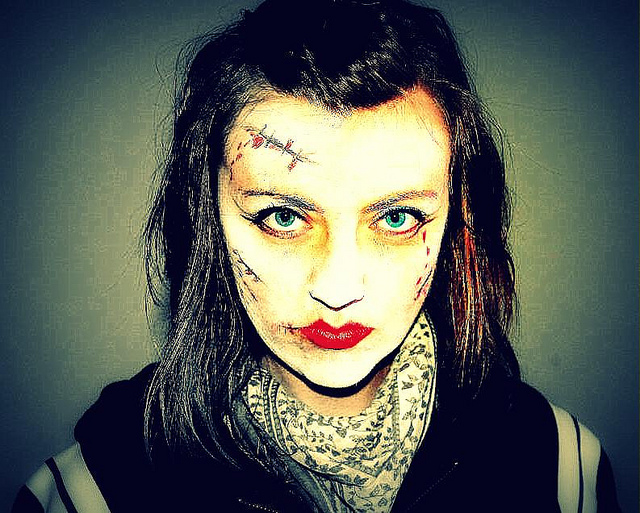Joy Lanzendorfer
I: Merry
“If there’s ever a zombie apocalypse, we’re going to be screwed,” Zach says. “All these dead people right next to the house? We won’t be able to kill them fast enough.”
Merry laughs and sidesteps a grave. They are looking for their lost cat by walking the perimeter of the cemetery near their house, calling softly, so as to be respectful, “kitty, kitty.” A sign out front said the graveyard was founded in 1900, but there’s a cabin by the eucalyptus forest that looks much older than that. For that matter, so do the eucalyptus trees, which, not being native to the area, must have been planted long ago, perhaps by pioneers.
It is spring. Mud squishes under their shoes from the rain. Hawks are nesting in the trees and a blue jay is squawking at them from an angel statue. The air is full of insects and floating seeds.
Across a patch of grass, Merry sees an animal. At first she thinks it’s a squirrel, but no, all the squirrels in the area are gray and this animal is brown. Then she thinks it’s a chipmunk, but no, this animal is too large for that. It could be a gopher, but they don’t come out of the ground like that, or stand like that, on their hind legs with their paws curled in front of them.
“Look,” Merry says. “I think it’s a prairie dog.”
She steps over a grave of a person who died in 1947, someone denoted only by the word “mother.” There’s a slab of concrete over the grave that is shaped like the coffin that lies underneath.
“I didn’t think we had prairie dogs around here,” she says. “Unless it’s a ground squirrel, but it doesn’t look like a ground squirrel, does it?”
As she says this, the prairie dog runs over to the grave and disappears. For a moment, Merry stands still, trying to understand where the prairie dog has gone. Then she notices a hole in the cement that once held a vase for flowers. The prairie dog is using it as an entrance for its tunnel.
Merry steps on the concrete slab and looks at the opening, which is perfectly round, like a sinkhole in the grave. Mesmerized, she stands with her hands hanging by her side until a strange smell wafts up from somewhere dank and rotten. She thinks of the mud from the recent rain and quickly steps toward Zach, who is waiting on the path. He puts his arm around her and they start again, calling softly, “Here kitty kitty. Here.”
II: Prairie Dog
The prairie dog was not a prairie dog. It lived in the graveyard. By this time, it had threaded the entire place with tunnels, prying apart the decaying mahogany and running among the bones, playing them like a xylophone with its feet. Its running disturbed the essences in the coffins, which were folded and sealed like packets of spider eggs. When the rodent went past, they were disturbed by the motion and unfolded, whooshing down the hole after it.
Or most of them did, anyway. Some were stubborn, staying near their remains out of habit or familiarity. Still, all it took was a frisson of distraction, that instant when the rodent’s breeze swept up against them and they lost their grip, falling on its fur as it passed. They felt like spider webs to the rodent. Its haunches shuddered as it galloped into the bowels of the earth, diving down into the sandstone bed where fossils lay in ancient torpor. There, it finally rested, chewing on the leather skin of the coelacanth or licking the shell of a nautilus, its eyes glazed with pleasure.
Sometimes though, the creature got lost in the older sections of the graveyard, where there were no grave markers anymore, or where there had never been any in the first place. Instead of making its way through the airy gaps of coffins, it was forced to tunnel through the loamy earth, going deeper and deeper. Its pace grew so sluggish that worms raced past it. Eventually, its fur closed back on its flesh, porcupine-like, so that it could glide easier and with less energy. If you could see it in this state, you would not think it was a rodent at all. It would look closer to a deep-sea fish, with eyes like white bubbles sunk into its face and gums pulled back to reveal a yawning maw, empty but for a single scissor tooth that it used to rend its tunnels.
But eventually, the creature emerged from these deep places, letting the sun warm its blood like a lizard and turn it to flesh again. This is what it was doing when there was movement that set the rodent-part of it on alert. Sliding into the hole, it froze, listening to the footsteps. And then the running began again, the Pied-Piper call of its skittering feet through the tunnels. It had been doing this for a long time, but time was all the same to the creature. It sought only to eat.
III: Ghost
When the rodent ran across my bones, it would have woken me. The spiky nails of its feet would have wheeled me. Then there was the expectant wind of its descent into the earth, that pulling call so strong and sucking. But as long as my bones are here, I would have remained. In case they come back for me. In case they look for me. Blanka Gutter. It should have been Blahn-ka, but everyone in life pronounced it Blank-a, emphasizing the “blank,” as if I were gone from life before I actually was.
Here it comes again, the creature running, pushing up and out, the dirt shifting around its tail. The sun never comes here, but in these seconds when the creature lopes through, it takes my sight with it, and I would have seen the outside for a moment, though only as a dream or memory. It is blinding after the dark. All those indistinct edges, flashes of color like a photograph fading from exposure. The vivid hues, the blues, the greens, the rust oranges. But then the creature sees someone on the surface and crawls into the hole that once held the flowers. There are footsteps, and the creature looks up at a girl, who stands in all her living sharpness—a wholeness without even the Swiss-cheese perforation of age and illness, yet. I would have seen her too, standing in her black tights and white wool sweater.
She cannot see the rodent, which quivers in its hole, but she stares, and I would have looked back at her, balanced on the tip of something, teetering. Her hair hangs loose and smells of some kind of chemical that came after when I would have lived. There is the barest shuffling sound, the worms that have gnawed the earth and the sow bugs still shedding their armored shells. And, too, the slight flutter of all the other things that do not have names. The soil is full of life, a jumble, a hoard, a multiplicity so immense that its numbers would crush all the life that walks its surface in an instant. To transcend this multitude, I would have pushed, would have climbed the boulder pile by my fingernails alone, but just as I would have moved past the barrier and reached the ends of the girl’s hair, the rodent shot off like a star, and I would have been towed along. It ran through its tunnel, its claws pushing into the soft dirt, and then the harder surface of the rotting pine box, and then the dusty powder of my remains. I would have held onto its fur like a rodeo clown on a bull as it dove out of my little box and down, down, down into the earth. And as the cool crumbles covered me like a tongue, I would have heard her calling again, the last sound ever from above. Something about a cat.
Joy Lanzendorfer’s work has appeared in Mental Floss, Salon, Hotel Amerika, Necessary Fiction, Superstition Review, San Francisco Chronicle, and many others.


